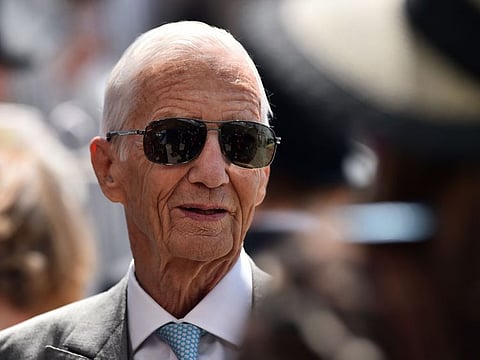Legendary jockey Lester Piggott dies at 86
11-time Champion English jockey has captured nine derbies and 5,300 races around world

London: Lester Piggott, an 11-time English champion jockey and one of the greatest horsemen in racing history, has died at age 86, the Telegraph reported.
No cause of death was given. Piggott had been hospitalised recently in Switzerland, where he spent much of his retirement, according to his daughter, Maureen Haggas. He had earlier been treated for heart problems.
Known as the “Housewives Favourite” for widening the popularity of horse racing, Piggott won his first race as a 12-year-old. He went on to capture nine English derbies and more than 5,300 races around the world during a career that spanned almost half a century. In Britain he rode 4,493 winners, the third highest tally in the nation’s racing history. In later years, his reputation was tarnished when he served jail time for tax evasion.
“An unbelievable man,” former jockey Graham Bradley has said of Piggott. “He could even think like a horse.”
Born in Wantage, Berkshire, on November 5, 1935, Piggott rose to prominence in 1948 when he won aboard The Chase at Haydock Park before reaching his teens. Six years later, his first English Derby title came on a 33-1 long-shot, Never Say Die.
More success in the country’s most prestigious flat race followed on Crepello in 1957, St. Paddy in 1960, Sir Ivor in 1968, Nijinsky in 1970, Roberto in 1972, Empery in 1976, The Minstrel in 1977 and Teenoso in 1983. In all, he won a total of 30 English classic races, including the Derby, and France’s Prix de l’Arc de Triomphe three times.
Tight finish
Piggott, who rode for leading trainers including Noel Murless and Vincent O’Brien, was a favourite among horse-race bettors because of his determination and his uncompromising nature in a tight finish. That was typified in the 1972 Derby when his liberal use of the whip urged Roberto over the line inches ahead of Rheingold at Epsom.
‘Old Stoneface’
“A good jockey doesn’t need orders and a bad jockey couldn’t carry them out anyway; so it’s best not to give them any,” Piggott said.
Piggott, who was partially deaf and suffered from a minor speech impediment, rarely showed emotion, earning another nickname, “Old Stoneface.” He was also referred to as the “Long Fellow” as he was tall for a jockey at just under 5 foot 8 (1.73 metres) and endured a stringent diet over decades to make the weight to ride.
Breeders’ Cup
He was awarded one of the highest civilian honours, Officer of the Order of the British Empire, in 1975, although the title was stripped after he was sentenced to three years in prison in 1987 for failing to accurately declare tax on about $4.8 million in earnings. Piggott had retired from riding and taken up training two years previously, and spent a year in jail.
He returned to riding in 1990 and within days of his comeback landed one of the most prestigious crowns in the US, the Breeders’ Cup Mile. He retired for good in 1995, aged 59.
Piggott was penalised more than once for his methods on the track, too. In one race, he took a whip from a fellow jockey when his own went flying, while at another, he pushed away the head of a competitor with his hand.
“When I was young, I didn’t want to get beaten and go back with excuses,” Piggott told the Observer newspaper in 2001. “It was every man for himself. Yes, I did cut up one or two, and them me, but you can’t do things, do your best to win all the time and be careful all the time.”
Sign up for the Daily Briefing
Get the latest news and updates straight to your inbox

